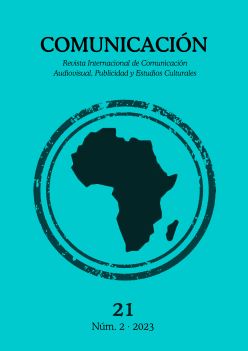Abstract
In this article, we propose to analyze Wanuri Kahiu's contributions to African queer cinema. We will discuss how in Rafiki (2018), only her second feature film as director, Kahiu presents and aesthetically develops the premises of an Afrobubblegum art proposed by her, in order to portray, in a context of hope and new possibilities, the experience of being queer in a heterosexist Africa. To this end, the research will resort to works such as those by Diawara (2007, 2010) and Adichie (2009) in order to demonstrate how the director's aesthetic proposal aims to counter predominantly pessimistic views that cinema projects regarding African countries. Additionally, we will explore the Kenyan director's story of struggle and resistance to see her film reach the screens in her country of birth and the importance that the screening of this work in Kenyan cinemas had as a moment of celebration of the existence of queer people in Africa. These discussions will be conducted based on contributions such as those from Louro (2008) and Green-Simms (2022) regarding the importance of queer cinema creating stories that show resistance and hope in the face of oppressive realities.
References
Adichie, Chimamanda (2009). TED Talk: O perigo de uma única histórica. Disponível em: < https://www.ted.com/talks/chimamanda_ngozi_adichie_the_danger_of_a_single_story/transcript?language=pt&subtitle=pt-br>. Acesso em 13.10.2023.
Bamba, Mahomed (2009). “Que modernidade para os cinemas africanos?”, em FORUMDOC.BH.2009. 13º Festival do Filme Documentário e Etnográfico -Fórum de Antropologia, cinema e vídeo., 2009, Belo Horizonte. Catálogo do Evento-Festival (pp. 183-190). Belo Horizonte, v. 00.
Diawara, Manthia (2007). A iconografia do cinema da África ocidental, em Meleiro, Alessandra (org.). Cinema no mundo: indústria, política e mercado: África (pp. 59-75). São Paulo: Escrituras Editora.
Diawara, Manthia (2010). African film: new forms of aesthetecs and politics. Munich; Berlim; London; New York: Prestel Verlag; Haus der Kulturen der Welt; Prestel Publishing Ltd.; Prestel Publishing.
Green-Simss, Lindsey B (2022). Queer African Cinemas. Durham: Duke University Press.
Johnstone, Lyn (2021). Queer Worldmaking in Wanuri Kahiu’s Film Rafiki. Journal of African Cultural Studies, 33 (1), 39-50.
Kahiu, Wanuri (2017). TED Talk: Fun, fierce and fantastical African art. Disponível em: https://www.ted.com/talks/wanuri_kahiu_fun_fierce_and_fantastical_african_art/transcript?language=en. Acesso em: 13.10.2023.
Kirui, Stacy (2018). Rafiki: On What It Means to Watch an Unbanned Film Seven Days in a Row, Every Single Day the Ban Was Lifted. Disponível em: https://popula.com/2018/11/27/rafiki/. Acesso em: 13.10.2023.
Louro, Guacira Lopes (2008). Cinema e Sexualidade. Educação & Realidade, 33 (1), 81-97.
Muñoz, José Esteban (2009). Cruising Utopia: The Then and There of Queer Futurity. New York: New York University Press.
Osinubi, Taiwo Adetunji (2019). Queer Subjects in Kenyan Cinema: Reflections on Rafiki. Eastern African Literary and Cultural Studies, 5 (1), 70-77.
Ravazzano, Lucas (2022). Memórias e afetos em “From a Whisper”. Revista Crítica de Cinemas Africanos. Disponível em: https://cinemasafricanos.com.br/?p=10. Acesso em 13.10.2023.
Stam, Robert (2003). Introdução à teoria do cinema. Tradução de Fernando Mascarello. Campinas/SP: Papirus.
Van Klinken, Adriaan (2018). Citizenship of Love: The Politics, Ethics and Aesthetics of Sexual Citizenship in a Kenyan Gay Music Video. Citizenship Studies, 22 (6), 650-665.

This work is licensed under a Creative Commons Attribution-NonCommercial-ShareAlike 4.0 International License.
Copyright (c) 2023 Lucas Ravazzano, Everaldo Asevedo


